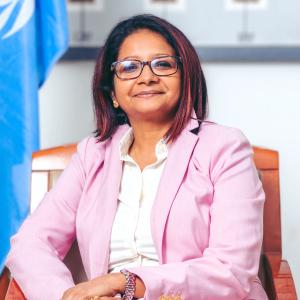Statement by UN Tanzania: National Multi-Stakeholder Validation for the 2023 Voluntary National Review (VNR) Report
Statement by Head of UN Resident Coordinator's Office in Tanzania, Ms. Shabnam Mallick at the National Multi-Stakeholder Validation for the 2023 VNR
- Dr. Natu Mwamba, Permanent Secretary, Ministry of Finance and Planning
- Dr. Mursali Milanzi, Commissioner of National Planning, MoFP,
- Dr. Rahma Mahfoudh, Executive Secretary, Planning Commission – Zanzibar
- Mr. Reynald Maeda, Co – Convener, Tanzania Sustainable Development Platform (TSDP)
- Ms. Marsha Yambi, Executive Director, UN-Global Compact Network TANZANIA
- Development Partners
- Editors, senior journalists and members of the press
- Government Officials
- UN Colleagues
- Distinguished Participants present here and joined online
Habari za asubuhi! (Good morning!)
I am pleased to be here on this significant occasion, nearly six months after the initiation of Tanzania's second Voluntary National Review (VNR). This event and the work that has gone into the second VNR is a demonstration of our collective journey towards the attainment of the Sustainable Development Goals (SDGs) and national goals in Tanzania; and highlights the shared commitment of all stakeholders, including the private sector, civil society organizations, and the media. It is noteworthy that this process has been nationally led.
The 17 SDGs, structured in five pillars (known as the '5 Ps' - People, Planet, Prosperity, Peace, and Partnership), which form the heart of the 2030 Agenda, embody our global responsibility to address some of humanity's greatest challenges.
In the words of UN Secretary-General António Guterres, “The 2030 Agenda is an agenda of justice and equality, of inclusive, sustainable development and human rights and dignity for all. It requires fundamental changes to the way the global economy is organized. The SDGs are the path to bridge both economic and geopolitical divides; to restore trust and rebuild solidarity. Let’s be clear: no country can afford to see them fail.”
The VNR process is a valuable tool for global monitoring and review of the SDGs. VNRs serve as a critical platform for countries to share their experiences, achievements, and lessons learned from implementing activities that contribute to the SDGs. It provides an opportunity for countries to receive feedback from other countries and stakeholders. The lessons learned through the VNR process will be invaluable in helping countries to accelerate their progress towards the SDGs. However, we must acknowledge the stark findings from this year's global SDGs Progress Report which was published in April.
Halfway to the 2030 deadline, we are not meeting our targets globally, with just 12% on track and over 30% stalled or in decline. The devastating impact of the COVID-19 pandemic, coupled with the climate crisis, biodiversity loss, and geopolitical tensions, are exacerbating these trends.
In the face of these adversities, Tanzania's second VNR serves as a testament to the Government’s enduring commitment to the 2030 Agenda. It offers an opportunity to acknowledge progress, analyze how the SDGs have been integrated into national plans and strategies, and understand the intersections of our economic, social, and environmental policies.
The second VNR Report notes that there has been good progress in goals 2, 3, 4, 5, 6,7, 8, and 16. Beyond these headline statistics, however, the picture is concerning. There has been relatively moderate progress in goals 1, 9, 10, 11, 12, 13, 14, 15, and 17. Just to take one example, progress in SDG 1 – poverty reduction – has been slow. Poverty only declined marginally, reaching a headcount rate of 26.4% in 2018, and down to 25.7% in 2020. Poverty is concentrated in rural areas, where 81% of the poor live. We need to do better in this and so many other areas. We need more participation of private sector finance if the goals are to be met. We need more domestic revenue; and, indeed we need more international development assistance. Let us take the opportunity during today’s discussions to understand what is impeding our progress and explore how we can do better in the coming days.
The report underscores the value of strengthened cooperation among all stakeholders, including the government, CSOs, private sector, media, and others. As the UN, we envision this report serving as a catalyst for enhancing the execution, oversight, and disclosure of our collective progress towards the SDGs.
The UN System in Tanzania reaffirms its commitment to support the Government on its journey towards the 2030 Agenda. We have supported the VNR process since its inception and stand ready to assist in the implementation of the forthcoming recommendations. Our Cooperation Framework with the Government of Tanzania -- the UN Sustainable Development Cooperation Framework (UNSDCF) identifies key areas for cooperation from 2022-2027, ensuring our support is evidence-based, targeted and effective.
We also wish to acknowledge the crucial role played by our partners in the private sector, civil society, media and other stakeholders present here today in-person and online. Their innovation, awareness-raising efforts, and influence on key decision-makers are instrumental to our shared progress. Your role in promoting and supporting the engagement of vulnerable or marginalized groups, particularly in the follow-up and review processes of the SDGs, is indispensable. We continue to invite more entities to join this critical initiative.
In closing, let me leave you with a quote from Antonio Guterres’s at his swearing-in as UN Secretary-General in 2016, shortly after the SDGs were launched: “We live in a complex world. The United Nations cannot succeed alone. Partnership must continue to be at the heart of our strategy. We should have the humility to acknowledge the essential role of other actors, while maintaining full awareness of our unique convening power.”
Let us use the momentum of the work that has gone into the VNR and the discussions we will have here today to accelerate progress, close existing gaps, and drive a sustainable future for all in Tanzania.
Asanteni sana!
Speech by


















